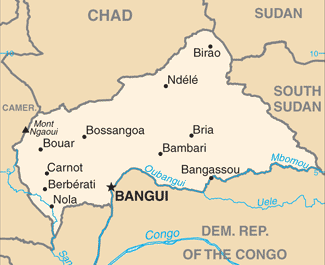
A court created seven years ago to prosecute war crimes in the Central African Republic was due to open its first trial this month. But a no-show by defense lawyers means victims’ associations and others pushing for justice will have to wait a little longer. The Bangui-based Special Criminal Court (SCC) is a hybrid tribunal composed of national and international jurists tasked with prosecuting war crimes, genocide, and crimes against humanity. It took time to become operational because of staff recruitment challenges, insecurity, and limited resources. Arrest warrants have also not been executed, and the government has released high-profile suspects without SCC authorization. Its inaugural trial—set to resume in April—concerns three members of the 3R rebel group accused of involvement in a 2019 massacre. Rebel groups remain active across the CAR, which has one of the highest per capita humanitarian caseloads in the world.
From The New Humanitarian, April 22
Note: The 3R group emerged as a self-defense force to protect the Fulani community from attacks by the Anti-Balaka militia, but was later accused in reprisal attacks that targeted civilians. The Special Criminal Court was formally established in 2015 but its work has been delayed in part due to lack of international support.





CAR militiamen found guilty in village massacres
The UN-backed Special Criminal Court (SCC) in the Central African Republic on Oct. 31 convicted and sentenced three militiamen for their role in a 2019 massacre at the villages of Koundjili and Lemouna in country’s north. The three members of the armed group known as 3R (for Return, Reclamation, Rehabilitation), were accused of war crimes and crimes against humanity for attacks which claimed the lives of 46 villagers in May 2019.After its first-ever trial, SCC handed down guilty verdicts along with one sentence of life imprisonment and two 20-year terms. (DW)